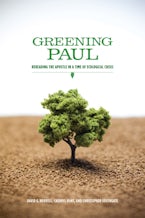The exegetical, theological, and ethical riches found in Greening Paul will promote invaluable reflection not only among Pauline scholars but also all Christian ministers and educators who desire to understand our pressing ecological crisis in light of Scripture. Greening Paul will prove to be a stimulating conversation partner for all involved.
~Presian Burroughs, Duke Divinity School
The exegetical, theological, and ethical riches found in Greening Paul will promote invaluable reflection not only among Pauline scholars but also all Christian ministers and educators who desire to understand our pressing ecological crisis in light of Scripture.
~Paul Trebilco, University of Otago, New Zealand
Greening Paul is an important and welcome contribution to the development of theology in our ecological era. Broad in its research and clear in its methods, this book reads Pauline scriptures carefully and creatively, and offers a model of how to read scripture in conversation with theology and science. It will be a useful resource for scholars, students, and church study groups.
~Willis Jenkins, Margaret Farley Assistant Professor of Social Ethics, Yale University
If Paul wrote to address problems in his own communities in the first century, what can his letters possibly offer about the environmental crisis that faces us today? The authors of Greening Paul argue convincingly that Paul’s notions of participation in Christ and reconciliation are cosmic categories and that God’s saving purposes include the whole universe and not just human beings. They construct a valuable hermeneutical lens through which they read the Pauline letters and shape a ecotheology and ecoethics. Essentially carving out a new theological field, their ecological analysis is insightful and their exegetical conclusions sound--a work well worth engaging.
~Tatha Wiley, Author of Paul and the Gentile Women: Reframing Galatians and Encountering Paul: Understanding the Man and His Message
This admirable study demonstrates that carefully-ground 'hermeneutical lenses' can focus and clarify one's perception of the implicit eco-theology and ethics in the Pauline letters.
~Victor Paul Furnish, University Distinguished Professor, Emeritus, of New Testament, Southern Methodist University
This well-written and carefully argued collaborative investigation is a must-read for environmental ethicists, biblical scholars, theologians, church practitioners, and their students.--,
~H. Paul Santmire, author of Nature Reborn (2000) and Ritualizing Nature (2008)
… invaluable to anyone engaged in study, teaching, or writing in the eco-hermeneutical field.
~Margaret M. Daly-Denton, The Journal of Theological Studies

